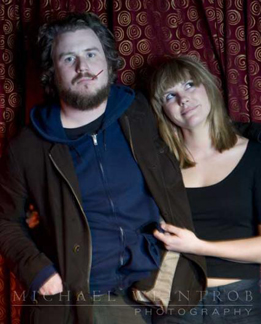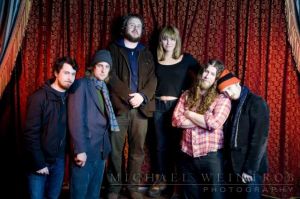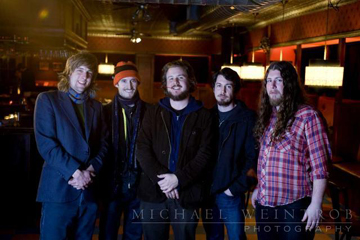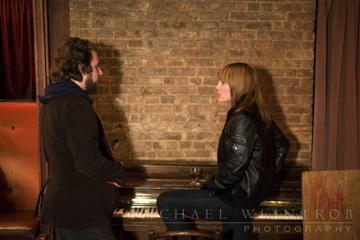Five Guys and A Lady: Grace Potter Interviews My Morning Jacket (Relix Revisited)
In anticipation of Grace Potter & The Nocturnals’ Grand Point North Festival and My Morning Jacket’s latest tour, we present this piece which originally ran in the June 2008 issue of Relix.

Photo by Michael Weintrob
Why would any publication want a girl like me to sit down and have a conversation with the bourbon-sipping Vikings of 21st century rock and roll? I don’t conduct interviews for a living, I’ve never been known for recalling things accurately and I tend to veer conversations directly into the gutter whenever possible. I have, however, had some memorable debaucheries with these fine fellows in the last couple years, and, I gather, after a week full of interviews, photo shoots, TV appearances and general overexposure that comes with putting out a new record, My Morning Jacket needed a little break.
I first heard about My Morning Jacket in 2005 from my friend Alex Crothers, the promoter at Higher Ground in Vermont. He’d taken them to this swimming hole in Huntington and the guys just had a wild good time and even though they didn’t sell a million tickets that night, it was just worth it because they’re such good guys. We bought their record It Still Moves a week later. And then followed it up the next day by buying the first two albums and the EPs.
I remember the tone in which that record hit my ears was especially beautiful and ambient because we were driving through northern California. There were Redwoods everywhere, the windows were all down in the RV and we had a crew of like nine people and we were all just kicking our feet up and cranking it through this great sound system.
What struck me first was the guitar, because, at that point, I had just picked up the guitar and I was formulating what kind of guitarist I wanted to be: Did I want to play lead parts or did I want to be a rhythm guitarist? I remember hearing Jim’s style and thinking, “Well, this is exactly what I want to play like.” Except I still haven’t quite gotten there.
We first saw them on the Bonnaroo DVD and it was just mind-blowing. It was just these incredible, hairy beasts. You couldn’t see anybody’s face which was even better because it just let the music do its thing. The hair and the rain at Bonnaroo and just the fierceness of that song “One Big Holiday,” it was killer. I think that’s how a lot of people first heard them – through that song. The puzzle doesn’t really come together until you see the whole package.
It wasn’t until Mountain Jam 2006 when I first saw them in-person and we all met. This is always a good sign: When a band can just kill you and make you feel like you’re in the middle of the ocean in a pitch black world and it’s daylight and raining and you’re on a ski hill. I remember standing side stage with Marco Benevento and watching them and Jim was sliding around on his knees. What was incredible about it is that they’d just come off the Pearl Jam tour and this was their first show where they were the stars.
I like music that can sound big but also sounds like it came from rock and roll. It’s easy to sound big with beautiful, jangly Coldplay chords and a stadium voice all the time with big melodies that everyone wants to sing along to but these guys have more going for them than that. There’s a depth to them: There’s blues, gospel and country. It’s something that they fearlessly attack.
I loved Z, the follow-up to It Still Moves, from the first second I heard it. We were all in the van, it was another group listen. You’ll find that a group listen can change your experience a lot. I was just smitten. I was completely taken aback and did not expect it. I was really blown away with how far they took it. It really made me wonder how much a producer has to do with how a record turns out. And that then it turned me around and made me realize that, no, you have to make a choice to make a record like this. Nobody can make you do it. These guys knew what they were doing and they went for it.
So I was ready for the new album, Evil Urges. I got the sense that they were going to go somewhere totally new, brave and different again. Getting ready to listen to it, I was fully prepared although I had no idea that they were going to have robot voices. That was pretty wild. “High Suspicious” is a highly suspicious song. That’s the key with a song like that: If you can pull it off, more power you to you. I know I couldn’t. Evil Urges proves that there’s really nothing that these guys can’t do well.
I think more than anything, what I get from the Jacket is the hard work they’ve put into it all. They are not a flash in the pan, overnight success band. They’ve gone through member changes, location changes, some pretty serious musical changes and they are still who they are at the core. They’re just very real and at the same time kind of mythical. More than any musical decision they make, that’s what hits me: how they’ve rambled on.
So here I am: A Vermonter in New York City, 20 minutes late, haggling with my cab driver until he kicks me out for not paying with cash. I’ve managed to lose my borrowed cell phone, forgot my camera and my notepad and am now looking for our meeting place, The Slipper Room, along a busy, sign-filled street on the Lower East Side with my very bad eyesight. As I bang on the locked door and pray that I’m on the right island, I think to myself “This whole journalism thing is fuckin’ hard.”
It doesn’t matter though: I know these guys. I can do this without questions and a list in front of me. The second I sit down at the table, it’s a bunch of real people putting their heads together and doing something fun. I think the whiskey probably helped, too.

Photo by Michael Weintrob
I feel like this record has more of everybody’s personality. I can see your faces when I listen to it. I can see you getting the ideas and laying them out. How did you guys write this record?
Patrick Callahan (drummer): It starts the same way every album does. Jim sits in his world and comes up with pretty much the structure of the whole thing and makes demos of it and hands it off to us and this time he went above and beyond the call of duty. How long were you at the cabin recording?
What cabin? Where was it?
Patrick: Virginia. The Shenandoah Valley, right? The only reason I know that is ‘cause I went down there like two weeks later.
Jim James (lead singer/guitarist): It was near Luray Caverns.
So you still kind of keep to the thing where you don’t ever write on the road?
Jim: I can’t really, can you?
It’s the only place I can do it really. I don’t write at home.
Jim: Really? I can’t write on the road.
So you just compile everything over the course of a short amount of time?
Jim: Well, I have to live life and get new life experiences – get new things happening. So I wrote everything I wrote over a period of a couple years and then made demos. My buddy talked me into getting [digital music editing software] Cubase. Have you ever used Cubase?
Uh-huh.
Jim: And Reason. So I was doing a lot of drum programming and beats and stuff like that.
So, a backing vocal like the one on “Highly Suspicious,” does that come to you in the cabin in the woods with the wood fire burning?
Jim: Yeah. It comes as a simple robotic idea which then we turn into more of an Italian pizzeria where we all gather around the wood hearth and make it into a real boy.
Who’s the dough?
Carl Broemel (guitarist): You bring in the pepperoni
Bo Koster (keyboards): I bring-a the oregano
Jim: I bring-a the rigatoni
[group laughter]
But who thought of those backup vocals for “Highly Suspicious” and who’s going do them onstage?
Jim: The goal of the backup vocals is for them to sound like angry British police officers knocking down your door with billy clubs. And we’ve hired robots to do those onstage
And they’re gonna actually do them?
Patrick: Yep. And we built them ourselves.
It reminded me a little bit of “The Monster Mash,” not in a bad way.
Jim: It’s cartoonish.
Who actually did those vocals in the recording?
Jim: Robots.
Awesome.
Patrick: English robots. With bobby hats.

Photo by Michael Weintrob
Have you talked about how this album is going to translate live beyond “Highly Suspicious” ? How do you congeal how you think things are going to be experienced from the crowd’s perspective?
Carl: We always have rehearsal, like anybody. You gotta figure it out and what’s missing – start playing this and that – and what’s absolutely important. This song needs to be there. It’s fun to throw these songs into the mess with all of the old songs, too, and see how they react. It’s still experimental ‘cause once you make the record, you spend all this time finding sounds.
You’re so in your head.
Carl: And getting into it and getting the perfect sound for everything and making each song sound different and then having to do that and having to play through all these songs. In rehearsal setting, it’s like, “Oh my god, we’ve spent like an entire day on this song. What do I do right now?” ‘Cause I have to play it now.
And you have to let all those sound things kind of go in a weird way because you have to just keep playing things.
Carl: Yeah, we just figure it out slowly. We’re still kind of in the middle of that
Bo: I don’t think we’re too anal either in terms of replicating sounds on the record. I already know “Touch Me, Part 1” is gonna be totally different. I can already tell. Like when we play it the first couple times it’s gonna have a different grittier feel.
Carl: It’s a smokier, sleazier song. It’s not as robotic.
Have you guys ever had that experience where a fan is pissed that you don’t do it the way you used to. Do you find that you get confronted with that?
Jim: There’s some stuff off the first record that we maybe do a little different, but I think we pretty much stick to things as they’re set. Because I feel like we already have a lot of variety and stuff so if we want to do something different, we can just play a different song we don’t necessarily need to do a reggae version of a song that’s not reggae, you know what I mean? Like change a song intentionally just to change it. But there are certain songs that are allowed to be different but I don’t know. I think for the most part we’ve got our system of things that happen and it’s all kind of orchestrated more than I think people realize it is. There are certain instances where we’ll let ourselves go into space.
I was hearing a lot of Prince on this record. It has a dance quality. Where did that come from?
Jim: Prince comes up a lot but there wasn’t much thought about Prince. I mean I love Prince. He’s the baddest motherfucker on the planet since James Brown died. I’m with Prince, I’m his number one supporter. But I feel like dance music and hip-hop music especially nowadays is kind of what makes the world go around. We’ve all always been into dance music and hip-hop at least to a certain extent, so on this record, I think we just kind of wanted to get everything. We started doing that on Z but we wanted to get the stuff more sucked in and more tight to where it’s not like we’re trying to make a hip-hop record but it’s like the drums and the bass are really propulsive and really getting you in that frame of mind but then there’s still room for the rest of us to do our thing over the top of it. We’re not like, “Here’s our hip-hop record,” ‘cause that’s just not what we do.
The drum beat was what I got caught up in because every song you’re going different than what I picture you as a drummer doing. On “Touch Me I’m Going to Scream” you go from small drum kit to big drum kit in that section where you guys unleash half way in. What do you spend your time doing? Do you ever play to a click track to nail that shit down?
Patrick: I don’t ever practice with a click track. We definitely used a click track sometimes with some of those songs just to maintain a certain tempo with it – a song has its own little character and you gotta find that character. And the tempo is part of that character and it defines the pace of that song and it exists at its best point, you know? I played to a click on a couple songs on this album and it was instrumental in holding it down. It’s a lot of fun to just assume different characters when you’re playing. It’s easy to just do the quote-unquote Bonham thing – to just fly off the handle and go all over the place, but to study a certain part of it. It’s amazing. It really is. When you have this driving beat going and you see four other guys bobbing their heads and carrying on this little line going through, it really just makes the greatest sense in the world to me.

Photo by Michael Weintrob
Tommy, the way that you play bass, it almost seems like you were birthed out of an R&B place and then you just totally grew from that. For each of you guys: Where did your story start and how did you change based on this music?
Two-Tone Tommy: Well, that’s the kind of answer that Patrick and I were talking about that the other day. How your body and your whole persona change depending on what song you’re playing. So I imagine a different character every time. Like were playing “Thank You Too” – not that there’s necessarily gonna be a specific person like [fabled Motown bassist James] Jamerson – but I kind of become that R&B dude or whatever. I have a different character. I’m gonna be Charlie now. And next I’ll be Francis.
Bo, when I see you playing keys, you’re cueing things, triggering samples and you’re doing other stuff. When you’re in the studio, are you birthing ideas or are you just figuring out what needs to be done?
Bo: Well, most of the samples I do is stuff we did vocally on the record. Especially the big wall of reverb vocals – I sample a lot of those. And then drum machines and stuff like that. So none of those are real ideas that come from me per se.
Patrick: But you execute them.
Bo: I execute them.
Patrick: And well, by the way.
That brings me to Joe Chiccarelli. We both used Joe on our albums and he’s a co-producer of Evil Urges.
Patrick: We used him.
We used him. He used you. He used you, my babies.
[group laughter]
Patrick: He used you, too.
How did you guys feel about what he brought to the table?
Jim: He was a thorough policeman. He’s got ears of gold which you cannot deny. He’s good at getting out the mop and broom and sweeping up the messes and stuff like that. He’s intense – he’s an intense person. He’s good for music and he’s a fucking badass.
Patrick: He’s a gangster.
He’s a gangster of sonic landscapes.
Patrick: He really is.
Jim: He is – it gets intense, but I think it’s good to get intense cause it means he cares and that means he wants it to get as good as it can be which isn’t always easy and it isn’t always fun but it’s what you need.
Patrick: But you wouldn’t want somebody that’s just complacent and like “Whatever….”
See, I want someone like that. I know exactly what I want it to sound like.
Patrick: I mean it’s not comfortable, but it produces good things with people when you’re dealing with the element of I don’t know, this drive from both sides, and he just brought it. It was awesome.
He was really excited about it when I talked to him. He was saying the sense of the record was very different – it was more from the soul but had this gospel influence to it. Were you guys ever kind of thinking about going in that direction?
Jim: We did – it’s pure gospel – through and through.
Yeah, obviously. I mean the backing choir of robots.
Patrick: We have the vestments.
Jim: It’s mutated.
Mutated gospel?
Jim: I mean it’s like rock and roll. Rock and roll started out as Chuck Berry, but now rock and roll is a lot of things.
It’s Yellowcard. It’s fucking My Chemical Romance.
Bo: Yeah. So when people think of gospel, some people think of the church, fast gospel beats, huge choirs and the organ/jazz kind of thing. But then there’s this other kind of gospel, which is like a lot of the stuff that you listen to like soul singers singing about God, Sam Cooke and stuff like that. So I think that when we use the term gospel in describing our record, it’s more the latter.

Photo by Michael Weintrob
That makes a lot of sense listening to the lyrics. It’s turned itself inside out and made itself something completely different but the lyrics are still covering themes you might hear in a Sam Cooke song, but in a very different way.
Jim: Right.
Did you change lyrics when you got into the studio or was everything pretty much laid out?
Jim: Everything was pretty much laid out. We went out to Colorado for a month before we went to New York to make the record, so the record was 90 percent done. I mean there were a couple of songs where I was finishing up lyrics toward the end of the whole thing but for the most part it was pretty much done.
I have to say that it is a surprise that you guys recorded in New York because after hearing the Allaire studio thing, I thought you guys would always record there. Did you feel like New York added to that experience at all?
Jim: Totally.
Patrick: It took us out of our element.
Have any of you ever lived in New York before this?
Patrick: No.
Jim: I’ve been kind of experimenting with living here now. It’s just fun to change it up a bit. We’ve always been out in the middle of nowhere for all our records – you know in Shelbyville [Kentucky] or upstate New York. We just wanted to try something different. Being here is just kind of crazy.
I feel like it would be distracting though.
Patrick: Not while you’re in the studio.
Jim: It’s more like a work thing. It wasn’t like a psychedelic adventure. We had our psychedelic adventure in Colorado and then we came here to work.
And, finally, what has been your most evil urge in the last hour?
Patrick: I wanted to kill the van driver. But I didn’t kill him because it was an urge and I didn’t act on it, but goddamn it I wanted to kill him. I really did.
Jim: I didn’t want to get product from Starbucks, but I did. Cause I was hungry and tired.
Carl: I wanted to get some tequila, but I knew nobody else would have joined me.
Jim: I would have gotten tequila instead of vodka.
It’s a stimulant.
Patrick: That’s not an evil urge. It’s beautiful.
Carl: That’s taking it a little bit too far.
I’m drinking whiskey, dude.
Bo: I wanted to binge on cookies but I didn’t.
Where were the cookies?
Bo: At Starbucks. I have a serious sugar addiction. If I have one, it’ll be over for a month.
Patrick: I’m proud of you – that’s awesome.
Really? Good for you.
Bo: Thanks. We’ll see what happens tomorrow.
Tom, what’s yours?
Tommy: Not getting Bailey’s in my coffee.
That was your evil urge – that you didn’t?
Tommy: I didn’t do it, but it was tempting.
Carl: Nobody would have even known – it would have been your little secret. Just you and God.
Tommy: Just me and the big man.



















